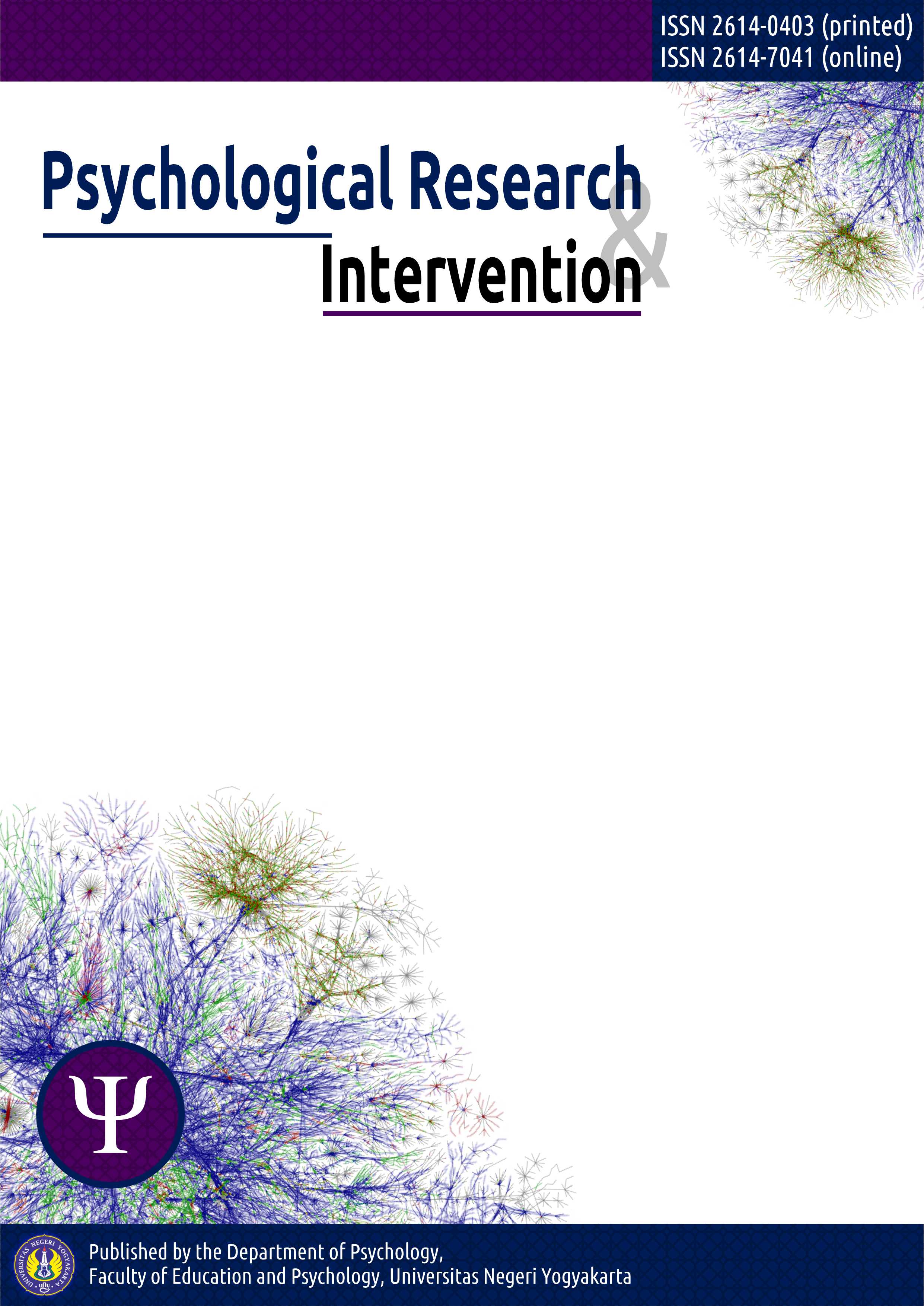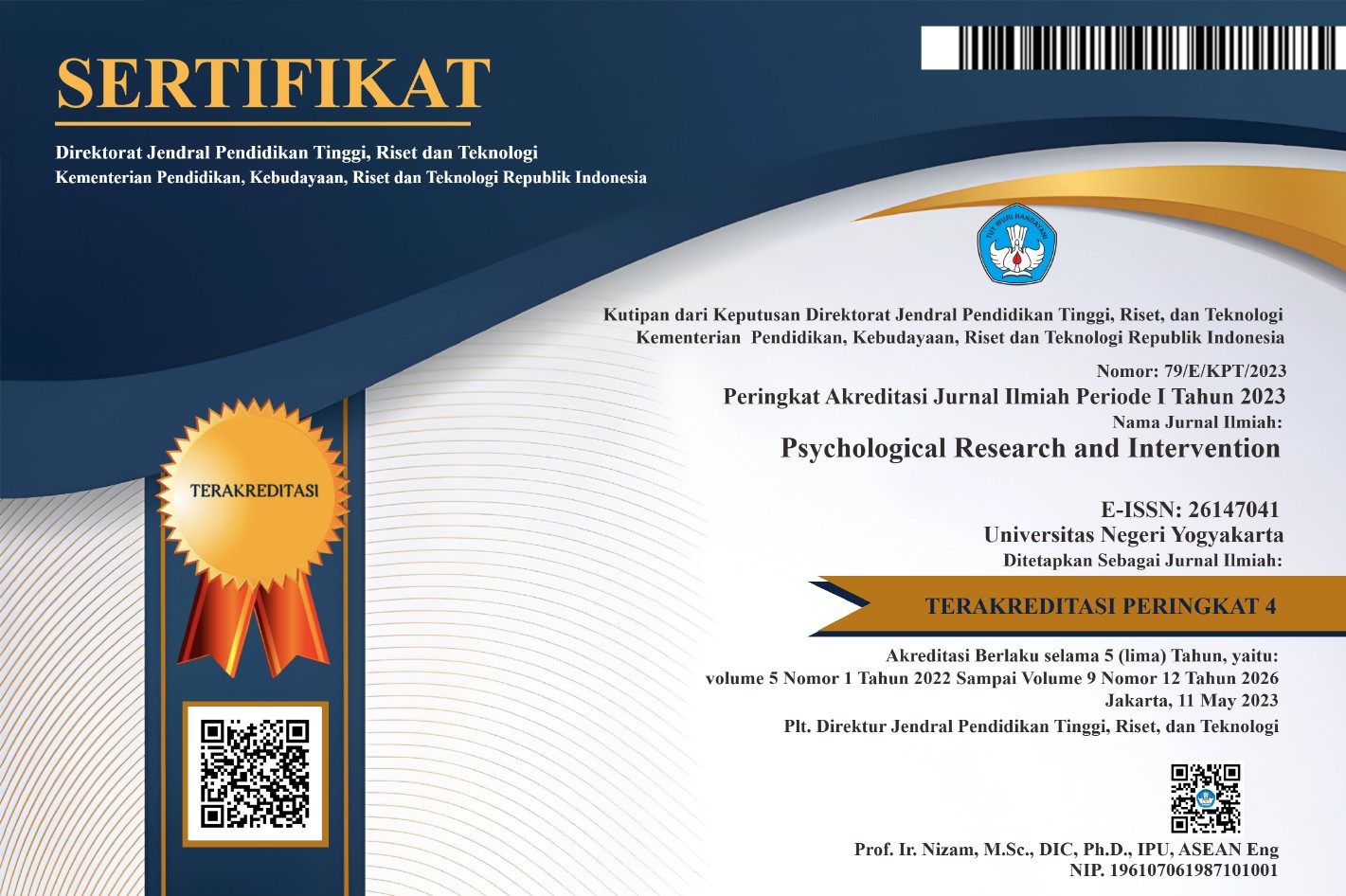Application of Internet-based Cognitive Behavior Therapy Approaches for Female Adolescent with Major Depressive Disorder
DOI:
https://doi.org/10.21831/pri.v4i1.41245Keywords:
adolescent, depression, internet-based cognitive behavior therapyAbstract
The purpose of this study was to measure the decrease in depression symptoms experienced by the participant before and after following the intervention by applying the Internet-based Cognitive Behavior Therapy (iCBT) approach. The participant was HN, a 14-year-old female adolescent who refused school due to major depressive disorder. The design of this study was a single-subject design with pre-post measurement. The intervention program was held eight sessions with a pre-session one day before, and a follow-up session was given two weeks after. The instruments used for this research are Beck Depression Inventory-II (BDI-II) to measure depression symptoms and Mood-o-meter, which serves as a mood rating to measure HN's mood fluctuation. This study showed depression symptoms decreased and positive mindset change and behavior towards the social environment at the end of the intervention program.
References
Andersson, G., Wagner, B., & Cuijpers, P. (2016). ICBT for depression. In Guided Internet-based treatments in psychiatry (pp. 17-32). Springer, Cham.
Beck, J. S., & Beck, A. T. (2011). Cognitive behavior therapy. New York, NY: Basics and beyond. Guilford Publication.
Beck, A. T., Steer, R. A., & Brown, G. (1996). Beck depression inventory–II. Psychological Assessment. https://doi.org/10.1037/t00742-000
Bradley, K. L., Robinson, L. M., & Brannen, C. L. (2012). Adolescent help-seeking for psychological distress, depression, and anxiety using an internet program. International Journal of Mental Health Promotion, 14(1), 23-34. https://doi.org/10.1080/14623730.2012.665337
Casey, L. M., Oei, T. P., Raylu, N., Horrigan, K., Day, J., Ireland, M., & Clough, B. A. (2017). Internet-based delivery of cognitive behaviour therapy compared to monitoring, feedback and support for problem gambling: a randomized controlled trial. Journal of gambling studies, 33(3), 993-1010. https://doi.org/10.1007/s10899-016-9666-y
Finning, K., Ukoumunne, O. C., Ford, T., Danielsson-Waters, E., Shaw, L., De Jager, I. R., Stentiford, L., ... & Moore, D. A. (2019). The association between child and adolescent depression and poor attendance at school: A systematic review and meta-analysis. Journal of Affective Disorders, 245, 928-938. https://doi.org/10.1016/j.jad.2018.11.055
Gore, F. M., Bloem, P. J., Patton, G. C., Ferguson, J., Joseph, V., Coffey, C., ... & Mathers, C. D. (2011). Global burden of disease in young people aged 10–24 years: a systematic analysis. The Lancet, 377(9783), 2093-2102. https://doi.org/10.1016/S0140-6736(11)60512-6
Gottlieb, J. D., Gidugu, V., Maru, M., Tepper, M. C., Davis, M. J., Greenwold, J., ... & Mueser, K. T. (2017). Randomized controlled trial of an internet cognitive behavioral skills-based program for auditory hallucinations in persons with psychosis. Psychiatric rehabilitation journal, 40(3), 283. https://doi.org/10.1037/prj0000258
Hadjistavropoulos, H. D., Pugh, N. E., Hesser, H., & Andersson, G. (2016). Predicting response to therapist-assisted internet-delivered cognitive behavior therapy for depression or anxiety within an open dissemination trial. Behavior therapy, 47(2), 155-165. https://doi.org/10.1016/j.beth.2015.10.006
Jackson-Koku, G. (2016). Beck depression inventory. Occupational Medicine, 66(2), 174-175. https://doi.org/10.1093/occmed/kqv087
James, I. A., & Barton, S. (2004). Changing core beliefs with the continuum technique. Behavioural and Cognitive Psychotherapy, 32(4), 431. https://doi.org/10.1017/S1352465804001614
Kemp, G. N., O'Connor, E. E., Kritikos, T. K., Curren, L., & Tompson, M. C. (2017). Treatment Strategies for Depression in Youth. In Handbook of Childhood Psychopathology and Developmental Disabilities Treatment (pp. 159-194). Springer, Cham.
Kumar, V., Sattar, Y., Bseiso, A., Khan, S., & Rutkofsky, I. H. (2017). The effectiveness of internet-based cognitive behavioral therapy in treatment of psychiatric disorders. Cureus, 9(8). https://doi.org/10.7759/cureus.1626
Lindefors, N., & Andersson, G. (Eds.). (2016). Guided internet-based treatments in psychiatry. Cham, Switzerland: Springer International Publishing.
Mufson L., Dorta K. P., Moreau D., Weissman M. M., Mufson, L. (2004). Interpersonal psychotherapy for depressed adolescents. New York, NY: Guilford Press.
Newby, J., Robins, L.,Wilhelm, K., Smith, J., Fletcher, T., Gillis, I., ... & Andrews, G. (2017). Web-based cognitive behavior therapy for depression in people with diabetes mellitus: a randomized controlled trial. Journal of medical Internet research, 19(5), e157. https://doi.org/10.2196/jmir.7274
Noguchi, R., Sekizawa, Y., So, M., Yamaguchi, S., & Shimizu, E. (2017). Effects of five-minute internet-based cognitive behavioral therapy and simplified emotion-focused mindfulness on depressive symptoms: a randomized controlled trial. BMC psychiatry, 17(1), 1-14. https://doi.org/10.1186/s12888-017-1248-8
Oud, M., De Winter, L., Vermeulen-Smit, E., Bodden, D., Nauta, M., Stone, L., ... & Engels, R. (2019). Effectiveness of CBT for children and adolescents with depression: A systematic review and meta-regression analysis. European Psychiatry, 57, 33-45. https://doi.org/10.1016/j.eurpsy.2018.12.008
Selph, S. S., & McDonagh, M. S. (2019). Depression in Children and Adolescents: Evaluation and Treatment. American family physician, 100(10), 609-617.
Sindahl, T. N. (2011). Chat Counselling for Children and Youth: A Handbook. Copenhagen: Bí¸rns Vilkí¥r.
Stallard, P. (2019). Think good, feel good: A cognitive behavioural therapy workbook for children and young people. John Wiley & Sons.
Topooco, N., Berg, M., Johansson, S., Liljethí¶rn, L., Radvogin, E., Vlaescu, G., ... & Andersson, G. (2018). Chat-and internet-based cognitive–behavioural therapy in treatment of adolescent depression: randomized controlled trial. BJPsych open, 4(4), 199-207. https://dx.doi.org/10.1192/bjo.2018.18












